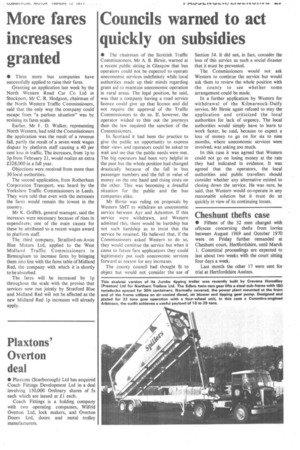Councils warned to act quickly on subsidies
Page 29

If you've noticed an error in this article please click here to report it so we can fix it.
• The chairman of the Scottish Traffic Commissioners, Mr A. B. Birnie, warned at a recent public sitting in Glasgow that bus operators could not be expected to operate uneconomic services indefinitely while local authorities made up their minds regarding grant aid to maintain uneconomic operation in rural areas. The legal position, he said, was that a company having a road service licence could give up that licence and did not require the approval of the Traffic Commissioners to do so. If, however, the operator wished to thin out the journeys then the law required the sanction of the Commissioners.
In Scotland it had been the practice to give the public an opportunity to express their views and operators could be asked to wait and see that the public needs were met. The big operators had been very helpful in the past but the whole position had changed drastically because of the fall in bus passenger numbers and the fall in value of money on the one hand and rising costs on the other. This was becoming a dreadful situation for the public and the bus companies alike.
Mr Birnie was ruling on proposals by Western SMT to withdraw an uneconomic service between Ayr and Adamton. If this service were withdrawn, and Western admitted this, there would be hardship but not such hardship as to insist that the service be retained. He believed that, if the Commissioners asked Western to do so, they would continue the service but when it came to future fare applications they could legitimately put such uneconomic services forward as reason for any increases.
The county council had thought fit to object but would not consider the use of Section 34. It did not, in fact, consider the loss of this service as such a social disaster that it must be prevented.
The Commissioners would not ask Western to continue the service but would ask them to review the whole position with the county to see whether some arrangement could be made.
In a further application by Western for withdrawal of the Kilmarnock-Dalfy service, Mr Birnie again refused to stay the application and criticized the local authorities for lack of urgency. The local authorities would simply have to learn to work faster, he said, because to expect a loss of money to go on for six to nine months, where uneconomic services were involved, was asking too much.
In this case it was agreed that Western could not go on losing money at the rate they had indicated in evidence. It was agreed that the operators, the local authorities and public travellers should consider whether any alternative existed to closing down the service. He was sure, he said, that Western would co-operate in any reasonable solution but it must do so quickly in view of its continuing losses.
































































































